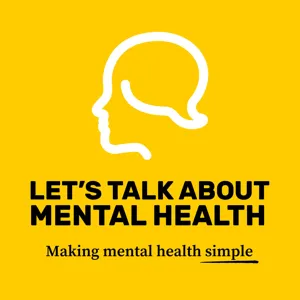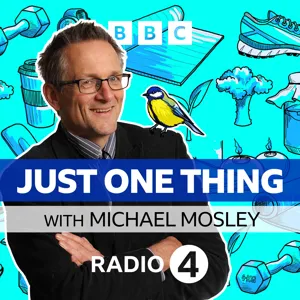Podcast Summary
The Role of Gratitude in Mental and Physical Health: Gratitude, a positive emotion, improves mental and physical health by lowering blood pressure, protecting the immune system, potentially preserving telomere length, and helping cope with stress and trauma.
Gratitude, a fundamental positive emotion, plays a crucial role in mental and physical health. According to research by Barbara Fredrickson, positive emotions like gratitude have numerous benefits. They make us feel good and also have tangible health benefits, such as lowering blood pressure, protecting the immune system, and potentially preserving telomere length. Positive emotions also help us cope with stress and bounce back from trauma and loss. It's important to note that the term "gratitude" is used as an umbrella term for positive emotions in general, as they all share the commonality of making us feel good by acknowledging the receipt of something good. Researchers like Barbara Fredrickson have faced challenges in studying positive emotions due to the stigma surrounding happiness and positivity in academia. However, their work has shown that positive emotions are not just feel-good experiences, but also have important health benefits. So, focusing on gratitude and other positive emotions can lead to better mental and physical health in the long run.
Positive emotions broaden perspective and improve well-being: Experiencing positive emotions regularly can lead to better mental health, creative problem-solving, improved mood, and the ability to dream bigger dreams.
Experiencing positive emotions regularly, even mild ones, can lead to significant benefits in terms of mental health and overall well-being. According to research, positive emotions broaden our perspective, allowing us to see the big picture and engage in creative problem-solving and open-minded decision-making. This can lead to better recovery from traumatic events, improved mood, and the ability to dream bigger dreams. Over the course of her career, Barbara Fredrickson has emphasized the importance of acquiring various resources, including those that come from positive experiences. Positivity, or the ability to experience positive emotions, is a valuable resource that can contribute to overall resilience and success.
The Power of Gratitude: Practicing gratitude leads to optimism, willingness to take risks, success, and greater well-being, making individuals less self-preoccupied and fostering interconnectedness.
Cultivating an attitude of gratitude can lead to numerous psychological benefits. Research by Robert Emmons, a leading expert on gratitude, shows that people who practice gratitude tend to be more optimistic, willing to take calculated risks, successful, and experience greater well-being. Gratitude is distinct from gladness, as the latter doesn't require acknowledging a gift received. Gratitude also makes individuals less self-preoccupied, fostering a clearer understanding of the larger world and our interconnectedness. Additionally, gratitude is a powerful reminder of the interdependence of individuals throughout history and a counterbalance to excessive individualism. Overall, gratitude is a valuable emotion that brings feelings of satisfaction and connection, addressing our primary needs of safety, satisfaction, and connection.
The Complexity of Gratitude: Gratitude can provide strength and resilience, but beware of using it as an excuse for inaction or overlooking systemic issues. Appreciate your blessings and avoid attribution bias.
Gratitude and thankfulness are complex emotions that can be challenging for some people, especially those facing hardships. It's important to be aware of the potential misuse of these emotions, such as using them as an excuse for not addressing systemic issues or leaving people in poverty. However, gratitude can also serve as a source of strength and resilience, even in difficult circumstances. People with greater privileges and wealth can learn to appreciate their blessings more fully and not fall into the attribution bias, overvaluing their own efforts and underestimating the role of luck in others' success. Ultimately, gratitude is not a substitute for action, but rather a mindset that can help us find contentment and motivation to improve our lives and the lives of those around us.
Gratitude and compassion go hand in hand: Feeling thankful doesn't diminish compassion, it can fuel it. Recognize the role of privilege and use gratitude to make a positive impact.
Feeling grateful for what we have does not diminish our compassion for those who have less. In fact, genuine thankfulness can lead to a desire to help and make a positive impact on the world. However, some people may find it difficult to feel thankful due to feelings of guilt or discomfort when comparing their privileged circumstances to the struggles of others. It's important to recognize that these feelings are not mutually exclusive, and that thankfulness and compassion can coexist. Additionally, avoiding thankfulness may serve as a way to avoid feeling guilty or overwhelmed by the reality of inequality and privilege. It's important to acknowledge the role of privilege in society and the responsibility that comes with it, while also focusing on the inner resources and benefits that come from practicing gratitude.
Embracing Dependencies for Gratitude: Acknowledging our dependencies and focusing on appreciation can help us grow our capacity for gratitude. Embrace life's gifts and be aware of tendencies to push away positive experiences.
Gratitude and thankfulness can be hindered by feelings of vulnerability and dependence, as well as the fear of being obligated to give in return. However, recognizing and accepting these dependencies and focusing on the readiness to appreciate the good things in life can help us grow our capacity for gratitude. We are all dependent on various things and people, and acknowledging this fact doesn't diminish our achievements or self-worth. Additionally, many things we receive, such as the gift of life, cannot be repaid. By embracing these realities, we can open ourselves up to the experience of thankfulness and make the most of the gifts we receive. Practicing a readiness to appreciate and being aware of our tendencies to push away positive experiences can help us cultivate a greater sense of gratitude in our daily lives.
Practicing Gratitude Improves Mental Health: Regularly expressing gratitude boosts mental health, deepens relationships, and fosters a more positive perspective on life
Practicing gratitude regularly, whether it's through simple acts like expressing thankfulness during meals or more formal exercises like the 3 blessings practice, can significantly improve mental health and well-being. This practice goes beyond just intellectual acknowledgment of things to be grateful for, but encourages an experience of gratitude and happiness that becomes deeply ingrained. The benefits of this practice extend beyond personal well-being, as it can also lead to improved relationships with others by fostering a more mellow, forgiving, and tolerant attitude. Additionally, expanding the scope of what one is grateful for, even to seemingly small or trivial things, can lead to a greater sense of awe and appreciation for the world around us. Ultimately, practicing gratitude can help shift our perspective from focusing on our own role in life's events to recognizing the gifts and blessings that come our way.
Cultivating Gratitude and Appreciation: Focusing on gratitude for external good fortune leads to mental well-being, essential for agency and positive emotions. Research by Barbara Fredrickson supports this, but embracing gratitude fully can be challenging. Practical ways to foster a more grateful attitude include recognizing good fortune, expressing thanks, and reflecting on past blessings.
Cultivating a mindset of gratitude and appreciation for the good things in life, even those beyond our control, can lead us to a more altruistic, kind, and mentally healthier perspective. When we accept that much of our good fortune is due to external causes, we can focus on what we can control and take responsibility for. Gratitude is linked to agency, and both are essential for mental well-being. The discussion touched on the benefits of positive emotions, the research of Barbara Fredrickson, the challenges of fully embracing gratitude, and practical ways to foster a more grateful attitude. Next week, we'll explore the idea of taking pleasure in the good experiences life brings us.






